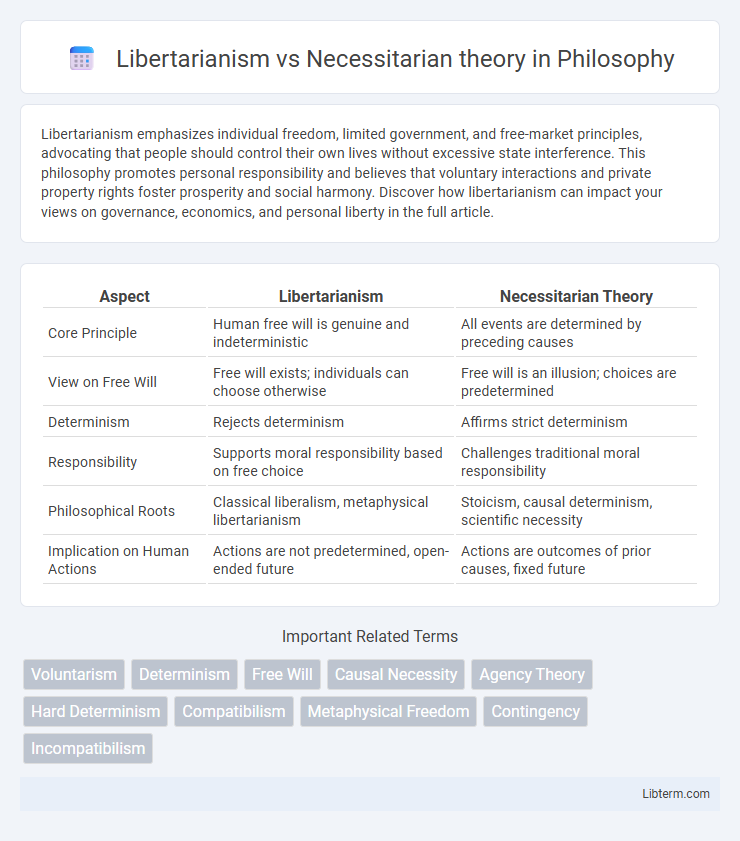Libertarianism emphasizes individual freedom, limited government, and free-market principles, advocating that people should control their own lives without excessive state interference. This philosophy promotes personal responsibility and believes that voluntary interactions and private property rights foster prosperity and social harmony. Discover how libertarianism can impact your views on governance, economics, and personal liberty in the full article.
Table of Comparison
| Aspect | Libertarianism | Necessitarian Theory |
|---|---|---|
| Core Principle | Human free will is genuine and indeterministic | All events are determined by preceding causes |
| View on Free Will | Free will exists; individuals can choose otherwise | Free will is an illusion; choices are predetermined |
| Determinism | Rejects determinism | Affirms strict determinism |
| Responsibility | Supports moral responsibility based on free choice | Challenges traditional moral responsibility |
| Philosophical Roots | Classical liberalism, metaphysical libertarianism | Stoicism, causal determinism, scientific necessity |
| Implication on Human Actions | Actions are not predetermined, open-ended future | Actions are outcomes of prior causes, fixed future |
Introduction to Libertarianism and Necessitarianism
Libertarianism asserts that individuals possess free will, enabling genuine choice and moral responsibility, opposing deterministic views. Necessitarianism, rooted in determinism, claims all events and actions are predetermined by prior causes, negating free will. These opposing theories shape fundamental debates in metaphysics and ethics regarding human autonomy and causality.
Defining Free Will in Libertarian Theory
Libertarianism defines free will as the genuine capacity of agents to make choices unconstrained by determinism, emphasizing that individuals possess alternative possibilities in decision-making. This perspective asserts that free will is incompatible with causal determinism, positing that agents are originators of actions rather than mere links in a causal chain. Key proponents argue that moral responsibility hinges on this freedom to choose differently under identical conditions.
Core Principles of Necessitarianism
Necessitarianism asserts that every event is determined by preceding causes, emphasizing causal determinism and the impossibility of alternative outcomes. Its core principles include the belief in strict causal laws governing all actions, negating free will as traditionally conceived. This perspective contrasts with libertarianism, which upholds free will and indeterminism as fundamental to human choice.
Historical Contexts of Both Theories
Libertarianism emerged prominently during the Enlightenment, emphasizing individual free will and moral responsibility against deterministic views prevalent in previous eras. Necessitarian theory, rooted in classical philosophy, traces back to thinkers like Democritus and Spinoza, who argued that every event is causally determined by preceding conditions. The historical clash between these theories reflects broader shifts in metaphysics and science, such as the rise of Newtonian physics reinforcing necessity and Romanticism reviving focus on autonomy.
Key Philosophers and Their Perspectives
Libertarianism, championed by philosophers like Robert Kane and Roderick Chisholm, asserts the existence of free will, emphasizing individual moral responsibility and the genuine ability to have acted otherwise. Necessitarian theory, defended by thinkers such as Baruch Spinoza and Ted Honderich, argues that every event, including human actions, is determined by preceding causes, rejecting the possibility of free will. The debate centers on the implications of determinism for moral accountability, with libertarians advocating indeterminism and necessitarians upholding causal determinism.
Moral Responsibility: Libertarianism vs Necessitarianism
Libertarianism asserts that moral responsibility hinges on individuals having genuine free will, enabling them to make choices independent of deterministic forces. Necessitarianism argues that all actions are predetermined by prior causes, challenging the notion of free will and thus reinterpreting moral responsibility as accountability within a causally determined framework. The debate centers on whether agents can be held morally responsible if their decisions are necessitated by external or internal determinants.
Arguments for Libertarian Free Will
Libertarian free will argues that individuals possess genuine freedom to choose otherwise in any given situation, rejecting determinism and emphasizing moral responsibility. Advocates highlight the unpredictability of human decision-making, suggesting that choices are not pre-determined by prior states or causal chains. Neuroscientific findings supporting the delay between brain activity and conscious choice serve as evidence for autonomous agency beyond deterministic necessity.
Determinism and the Necessitarian Viewpoint
Libertarianism argues for free will, rejecting determinism by claiming that individuals have genuine choice unconstrained by prior causes. The Necessitarian viewpoint, rooted in determinism, maintains that every event and decision is necessitated by preceding factors, leaving no room for alternative possibilities. Determinism in the Necessitarian theory implies a universe governed by immutable laws where human actions are preordained and inevitable.
Criticisms and Counterarguments
Libertarianism faces criticism for its challenge in explaining how free will can exist in a causally determined universe, with skeptics arguing that it leads to randomness rather than true agency. Necessitarian theory is criticized for undermining moral responsibility by asserting that all actions are predetermined, eliminating genuine choice. Counterarguments for libertarianism highlight the compatibility of indeterminism with meaningful choice, while defenders of necessitarianism argue that understanding causality can deepen ethical accountability by framing actions within inevitable contexts.
Contemporary Relevance and Applications
Libertarianism emphasizes individual free will and moral responsibility, influencing contemporary debates on criminal justice reform and personal autonomy in medical ethics. Necessitarian theory asserts determinism, shaping discussions in neuroscience and legal systems regarding the predictability of human behavior and accountability. Both frameworks critically inform policy-making, philosophy of law, and ethical considerations in emerging technologies such as AI decision-making.
Libertarianism Infographic

 libterm.com
libterm.com